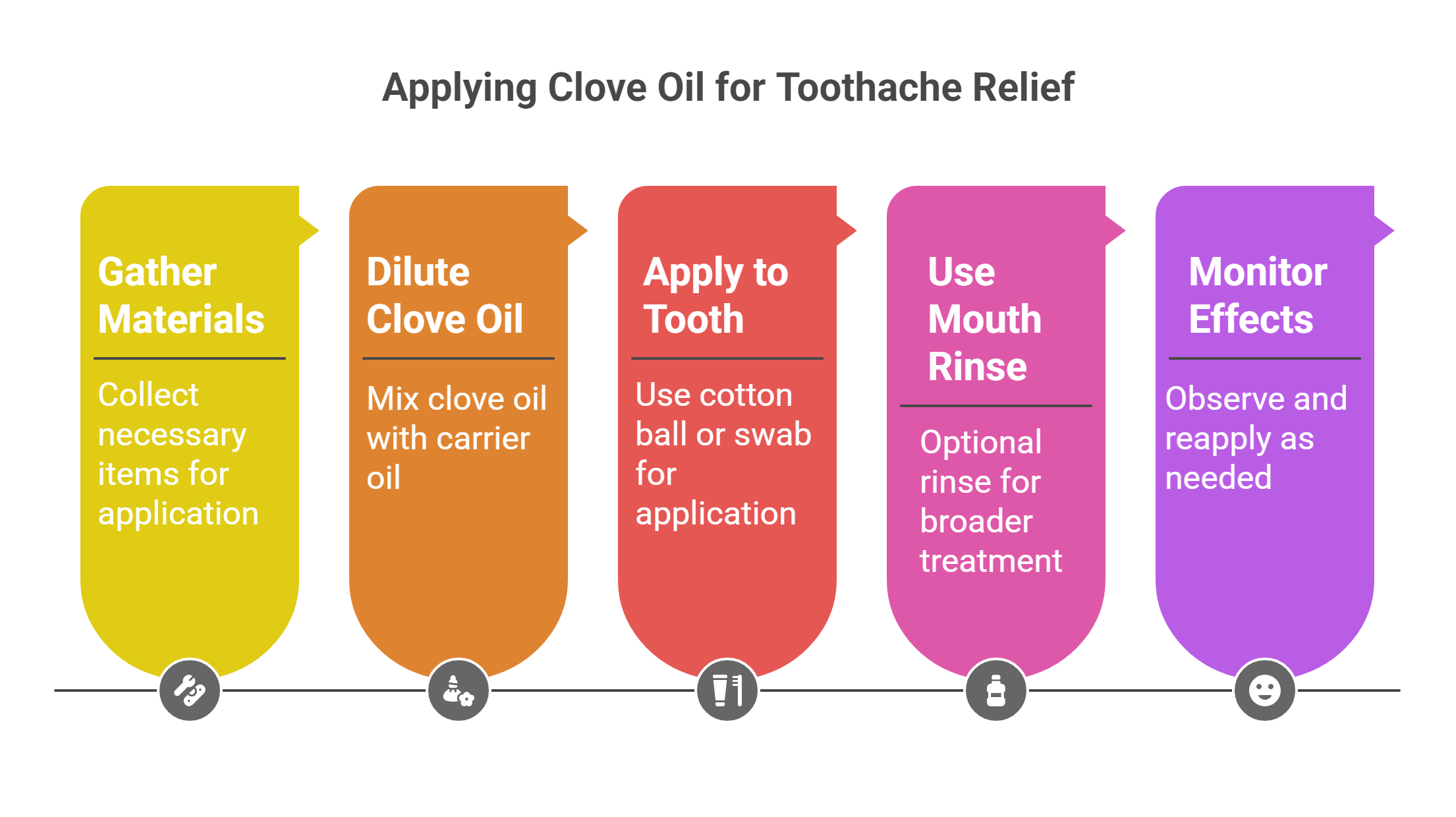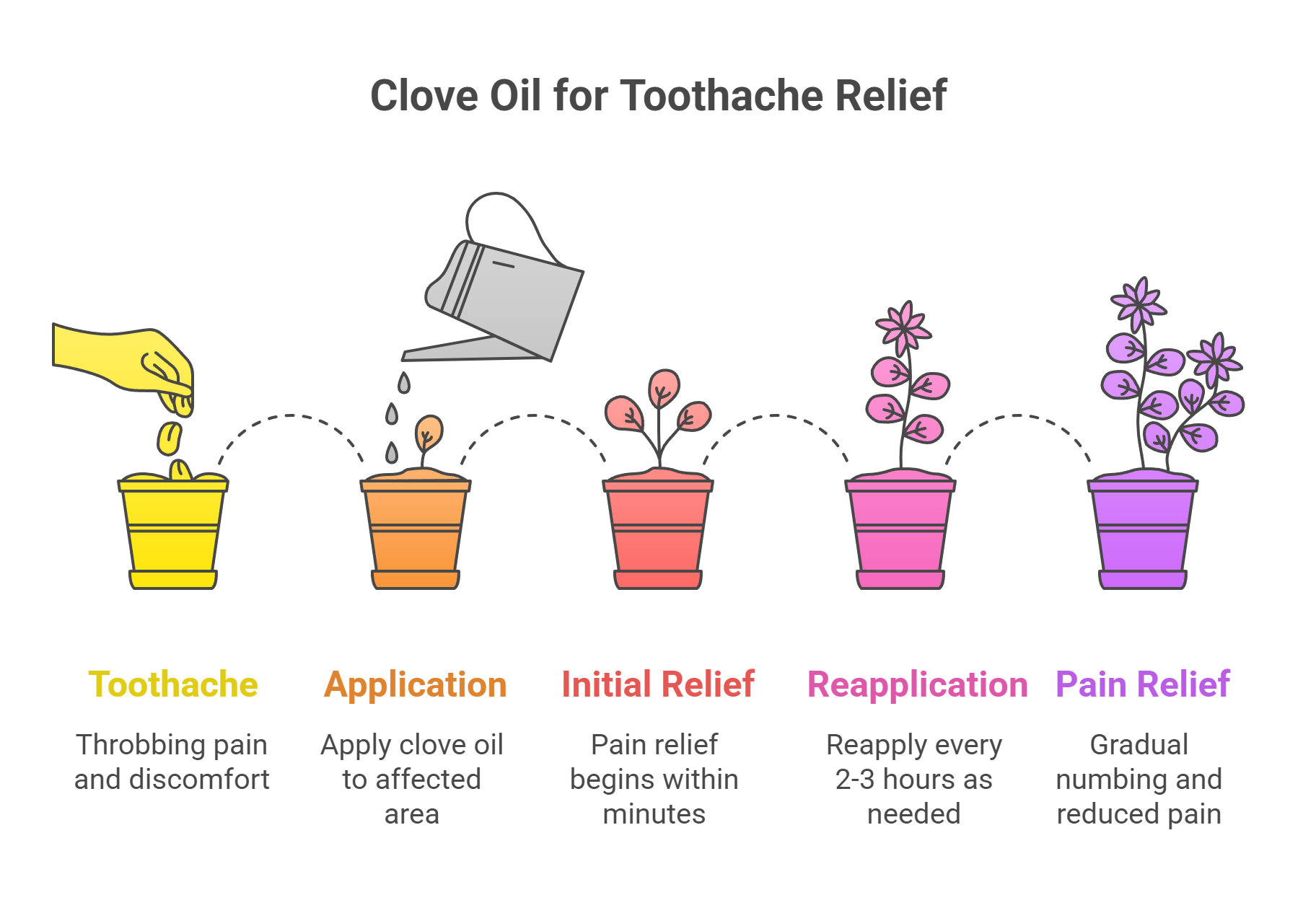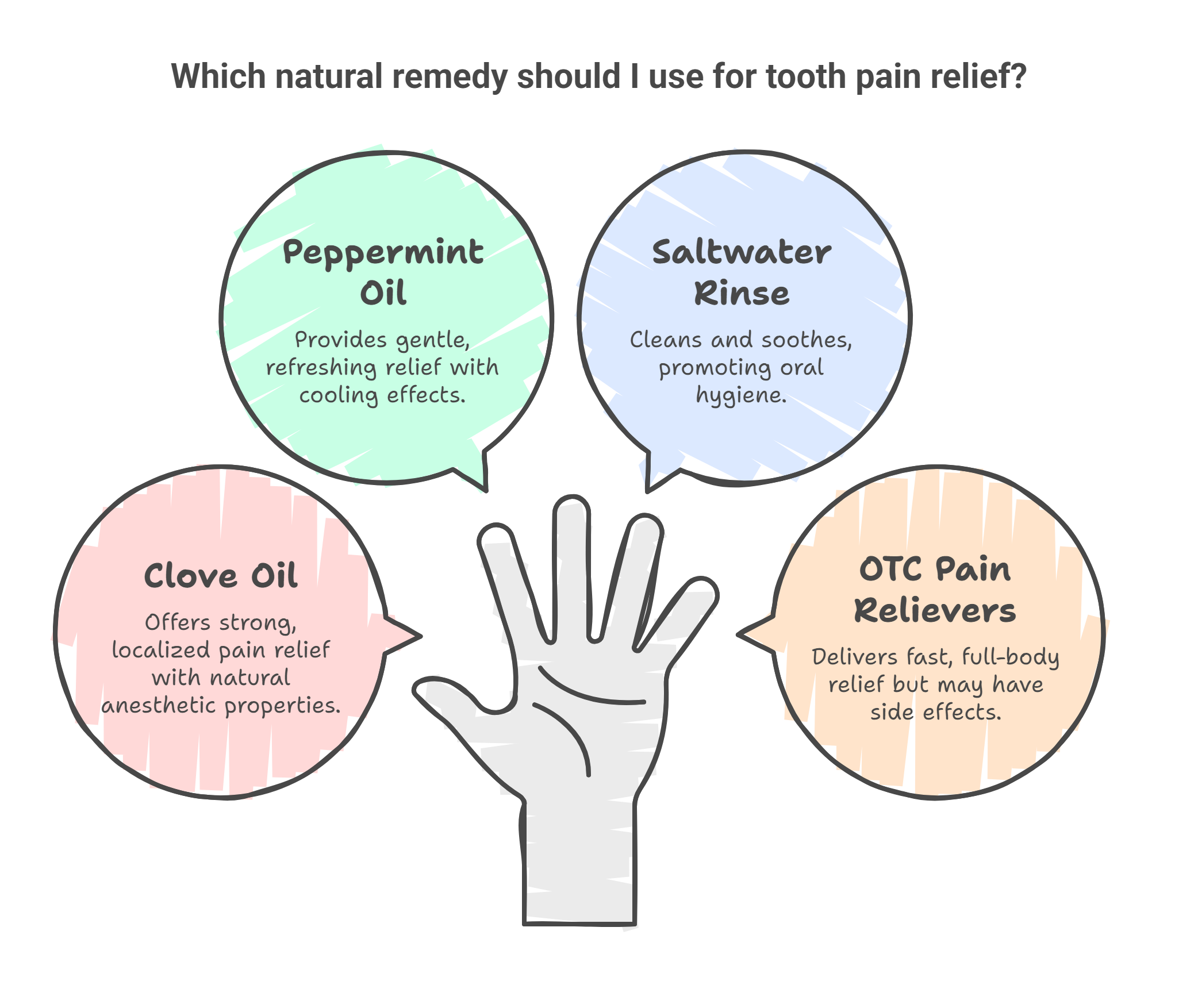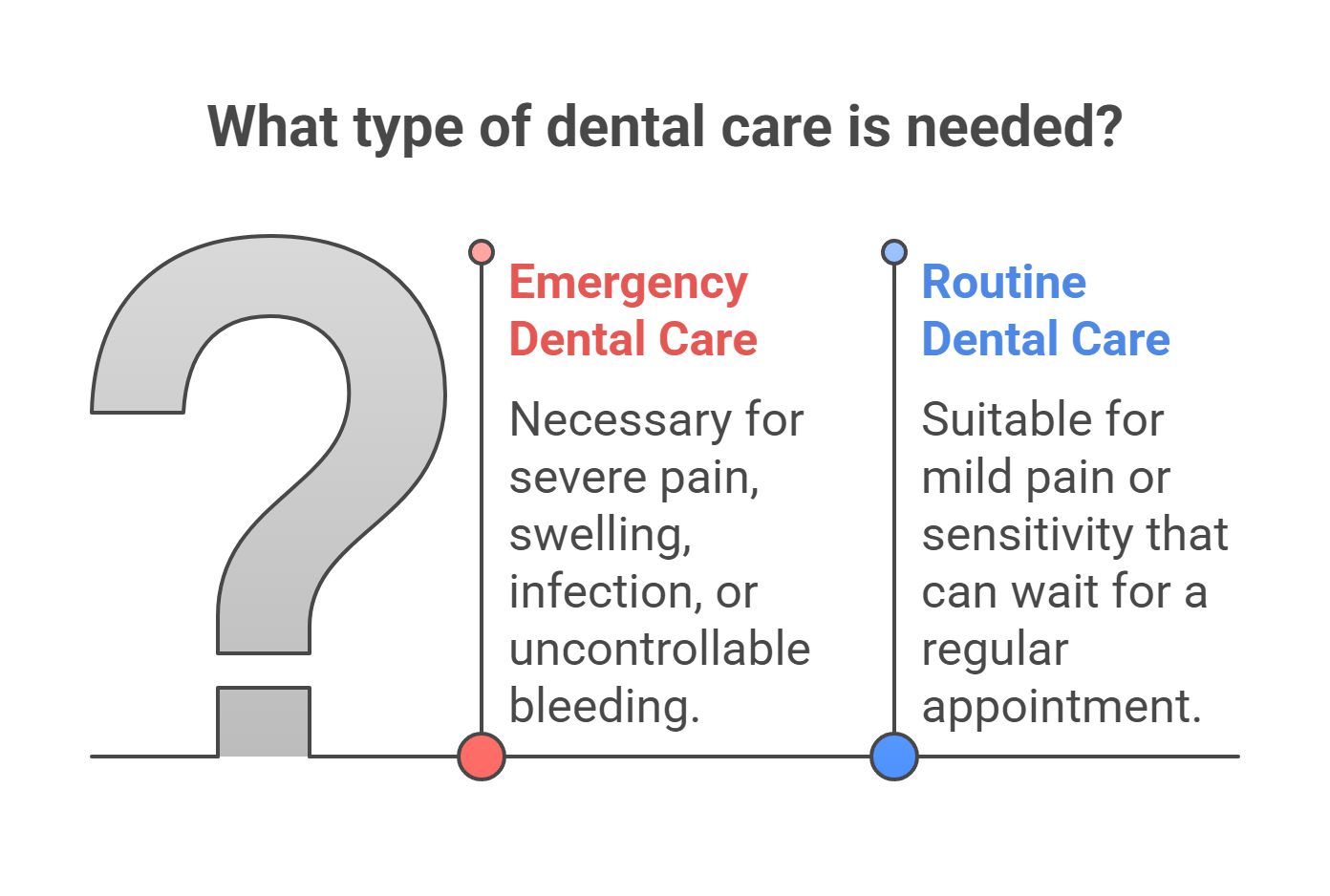Dealing with tooth pain?
Many turn to clove oil for a toothache as a fast-acting natural remedy.
Known for its powerful pain relief properties, clove oil tooth pain relief comes from eugenol, an essential oil compound. When you use clove oil, always dilute clove oil with a carrier oil like coconut or olive oil, just a few drops can safely relieve tooth pain.
This guide explains how clove oil works, how to use clove oil effectively, and whether clove oil works as well as claimed for toothaches.
Key Takeaways
-
Clove oil is effective for tooth pain relief due to its active ingredient, eugenol, which has analgesic, antibacterial, and anti-inflammatory properties.
-
Safety precautions, including diluting clove oil with a carrier oil and consulting healthcare professionals, are essential to avoid irritation and adverse side effects.
-
While clove oil can provide temporary relief for toothaches, it is crucial to seek professional dental care for persistent issues and underlying problems.
Why Clove Oil Is Effective for Tooth Pain
Clove oil is widely recognized as a natural solution for managing tooth pain due to its primary natural compound, eugenol. This ingredient offers analgesic properties, anti-inflammatory benefits, and antibacterial effects that make it a powerful option for temporary relief from common dental issues like tooth decay, gum inflammation, and sensitivity. When applied directly to the affected area, clove oil works by numbing the nerve endings, reducing both discomfort and swelling.
Unlike some remedies that offer only short-term relief, clove oil’s therapeutic effects are backed by science. A 2006 clinical study showed clove oil to be just as effective as benzocaine, a common topical anesthetic, in delivering quick relief. Research also highlights its antimicrobial activity against harmful bacteria like Streptococcus mutans—a major contributor to tooth decay.
Historical Use of Clove Oil in Dentistry
Clove oil has been used for centuries in traditional medicine, especially in Indian and Chinese practices, for treating toothaches. In modern dentistry, it remains an integral part of many dental procedures. It’s frequently used in mouth rinse formulas and for managing discomfort during root canals and minor surgeries. Its ability to ease pain and support oral hygiene explains its long-standing reputation among professionals.
Despite being a generally safe remedy, clove oil must be applied with care. Overuse or undiluted application may irritate mouth tissues, cause a burning sensation, or damage mucous membranes. For safety, apply diluted clove oil with a cotton ball and gently press it onto the gum area or affected area. This method targets pain while minimizing risk to surrounding tissue.
Scientific Support for Clove Oil
Modern science validates what ancient healers already knew. Clinical trials have confirmed clove oil’s effectiveness in providing temporary relief from dental pain, even comparing favorably with conventional anesthetics. It not only reduces inflammation but also fights bacteria that aggravate pain and infection.
While effective, it's important to remember that clove oil is best used as a short-term relief strategy. It’s not a permanent fix for deeper dental issues. Anyone who experiences allergic reactions or ongoing pain should consult a dental professional or healthcare professional to prevent the condition from worsening.
For best results and safe usage, seek guidance from a dental professional, especially if you have existing conditions or concerns about repeated use.
How to Safely Apply Clove Oil for Toothache Relief: Step-by-Step

Clove oil, a powerful natural remedy derived from the clove tree, offers temporary relief from toothache pain thanks to its natural compound, eugenol—the same active ingredient responsible for its antibacterial properties, anti-inflammatory benefits, and role as a natural anesthetic. Whether you’re dealing with a sore tooth, an aching tooth, or dental discomfort, this natural solution can be an effective option—if used correctly.
Follow these simple and safe method steps for the best results while protecting your oral health:
Step 1: Gather Your Materials
You'll need:
-
Pure clove oil
-
A carrier oil, like coconut oil or olive oil
-
A cotton ball or cotton swab
-
A small dish for mixing
Step 2: Dilute the Clove Oil
To combine clove oil safely:
-
Mix 2–3 drops of clove oil with 1 teaspoon of a carrier oil.
-
This step ensures the oil is generally safe to apply without causing a burning sensation or damaging the mouth tissues and gum area.
Tip: Never use undiluted clove oil directly—it can harm the tooth pulp and worsen gum irritation.
Step 3: Apply the Oil to the Affected Tooth
-
Soak a cotton ball in the diluted mixture.
-
Gently press it against the affected tooth or affected area for 5–10 minutes.
-
Alternatively, use a cotton swab for precise application—especially useful when reaching the back molars or tight spaces.
This method allows the active ingredient to penetrate the pain site, ease tooth pain, and reduce swelling and bacteria—delivering quick relief.
Step 4: Use a Clove Oil Mouth Rinse (Optional)
Prefer a broader treatment for the gum area or to maintain oral hygiene?
-
Add a few drops of clove oil to a glass of warm water.
-
Use this mouth rinse 1–2 times daily to reduce bacteria and inflammation around the affected area.
This is ideal for general dental care or soothing gum irritation associated with dental issues like tooth decay.
Step 5: Monitor Effects and Reapply as Needed
-
Relief typically begins within minutes and can last up to 2–3 hours.
-
Reapply every few hours as needed, up to three times daily, for short-term relief.
If pain continues or worsens, it's time to seek professional dental care or consult a dental professional.
Important Safety Tips
-
Always dilute clove oil before use to avoid damage to the mouth tissues or the tooth pulp.
-
Avoid ingesting the oil or overusing it—despite its natural properties, overuse may result in a burning sensation.
-
If you experience allergic reactions, stop use immediately and speak to a healthcare provider.
-
This is a short-term pain relief measure—home remedies do not replace proper dental procedures or treatment.
When to Seek Help
If symptoms persist beyond 24–48 hours or worsen, especially in cases of:
-
Swelling
-
Fever
-
Severe toothache pain
-
Signs of infection
You may need emergency dental care. Toothaches clove oil might ease symptoms, but addressing the underlying dental issues requires help from a dental professional or healthcare professional.
Final Note: While clove oil is safe for most people when used correctly, it’s best to use it as part of your oral hygiene routine for dental health—not a replacement for regular check-ups or necessary treatments like root canals or cavity fillings. Always prioritize dental care from licensed professionals.
What to Expect: Timeline and Effectiveness

After applying clove oil, you can expect pain relief to begin within 2-5 minutes. The duration of its effect typically lasts between 1 and 3 hours, depending on the severity of the toothache. Signs that the treatment is working include a gradual numbing sensation and a reduction in throbbing pain.
For optimal results, it’s essential to follow the recommended application guidelines. Reapply the clove oil mixture every 2-3 hours as needed, but do not exceed three applications per day. This ensures that you receive consistent relief while minimizing the risk of irritation or other side effects.
Side Effects and Precautions
Clove oil can offer fast toothache relief due to its analgesic properties, but it must be used properly to avoid adverse effects. When applied correctly, it is generally safe. However, caution is necessary to protect sensitive areas like nerve endings and mucous membranes.
Why Dilution Matters
Undiluted clove oil is highly concentrated and can irritate the skin, mouth tissues, and gums. It may lead to redness, a burning sensation, or even mild chemical burns. To prevent this, always dilute clove oil with a carrier oil, such as coconut or olive oil, before applying it to the affected area.
Clove oil should only be used as a temporary remedy for tooth pain while seeking professional dental care for the underlying cause.
Common Side Effects
Some users may experience minor side effects, including:
-
Mild irritation or redness at the application site
-
A burning sensation is experienced when used in high concentrations
-
Sensitivity near nerve endings or the tooth pulp
In rare cases, individuals may experience allergic reactions, such as itching, swelling, or difficulty breathing. If these symptoms occur, discontinue use and seek medical attention promptly.
To minimize risk, perform a patch test on your skin before applying clove oil inside your mouth.
Important Precautions
To use clove oil safely:
-
Never apply it in concentrated form
-
Do not swallow the oil mixture
-
Avoid using it for extended periods
-
Consult a dental professional or healthcare provider, especially if you have existing health conditions or are taking medication.
While clove oil is safe for food use in small amounts, overuse can lead to complications. People with bleeding disorders or those on blood-thinning medications should be especially cautious.
Children and Pregnant Women
Clove oil is not recommended for young children unless approved by a pediatric dentist. Its potency may cause adverse reactions, particularly on mucous membranes or sensitive tissues. It should be stored safely out of reach of children and pets.
Pregnant and breastfeeding individuals should avoid using clove oil unless approved by a healthcare provider. Safety during pregnancy has not been fully established, and the oil’s strength may pose a risk.
Comparing Clove Oil to Other Natural Remedies

While clove oil is a powerful solution for tooth pain, it’s not the only option. Several other natural remedies offer pain relief, each with its strengths and limitations. By comparing clove oil with alternatives like peppermint oil, saltwater rinses, and over-the-counter pain relievers, you can better decide what works best for your needs.
Clove Oil vs. Peppermint Oil
A common alternative to clove oil is peppermint oil. Known for its cooling effect from menthol, peppermint oil can help mask pain and reduce inflammation. This makes it useful for those seeking a more refreshing, gentle approach to toothache pain.
However, unlike peppermint oil, clove oil’s active ingredient—eugenol—acts as a natural anesthetic, delivering longer-lasting pain relief by numbing nerve endings at the affected tooth. While peppermint oil offers quick and mild relief, clove oil is often better suited for more severe or persistent discomfort.
Clove Oil vs. Saltwater Rinse
If you’re looking for something simple and accessible, saltwater rinses are a popular option. They help reduce bacteria, clean debris, and promote oral hygiene, making them a reliable go-to for general dental care.
That said, saltwater does not provide the same targeted pain relief as clove oil. While a rinse can soothe irritation and reduce inflammation, it lacks the numbing power of eugenol. For best results, many find it helpful to combine both: use a saltwater rinse to cleanse the area and follow with clove oil for focused relief.
Clove Oil vs. Over-the-Counter Pain Relievers
For those in need of fast, full-body relief, over-the-counter (OTC) medications like ibuprofen or acetaminophen are often the first line of defense. These drugs work well for managing inflammation and reducing dental discomfort, especially after procedures or during infections.
Still, clove oil offers a more natural solution, working directly at the source of the pain without systemic side effects. Its ability to ease tooth pain locally and naturally makes it ideal for those looking to minimize drug use or supplement their treatment with home remedies.
When Home Remedies Aren't Enough

While clove oil and other home remedies can provide temporary relief, they should not replace professional dental care for persistent issues. If tooth pain lasts more than two days, it is essential to seek a dentist’s assessment to address underlying problems. Regular consultation with a dentist is advised when using clove oil frequently for toothaches.
Clove oil provides temporary symptom relief but does not cure the root cause of dental issues. Professional evaluation is necessary to prevent complications and ensure long-term oral health. Persistent pain, swelling, or other severe symptoms should prompt immediate dental evaluation.
Red Flag Symptoms Requiring Immediate Dental Care
Certain symptoms indicate the need for immediate dental care:
-
Swelling in the face or jaw
-
Severe pain that persists beyond 48 hours
-
Excessive bleeding
-
A dental abscess, which can present as a swollen, painful area in the gums
-
A foul taste in the mouth, which may indicate infection
If you experience uncontrollable bleeding, unbearable pain, or any symptoms of infection, such as fever or discharge from the affected tooth, seek emergency dental care immediately. Recognizing these symptoms early can prevent further complications and ensure prompt treatment of serious dental issues.
Understanding Emergency vs. Routine Dental Situations
Understanding the difference between emergency and routine dental situations is crucial for an appropriate response. Emergency dental care is necessary for:
-
Severe pain lasting more than 48 hours
-
Facial or gum swelling
-
Signs of infection
-
Pain when biting down
In these cases, same-day treatment is often required to prevent further complications.
Routine dental issues, such as mild tooth pain or sensitivity, can usually wait for a regular appointment. However, managing pain safely while awaiting professional care is important for your dental health. Over-the-counter pain relievers and home remedies like clove oil can help relieve tooth pain and provide temporary relief until you see a dental professional. Always consult with a dentist to determine the appropriate course of action for your specific situation to prevent tooth decay.
Final Thoughts
Clove oil is a powerful natural remedy that can offer quick, temporary relief from toothache pain when used correctly. Its active ingredient, eugenol, delivers analgesic, antibacterial, and anti-inflammatory benefits, making it a valuable tool for managing dental discomfort at home. However, it’s essential to dilute clove oil with a carrier oil and apply it carefully to avoid irritation or side effects.
While clove oil can ease symptoms, it is not a substitute for professional dental care. Persistent or severe tooth pain may indicate underlying issues that require diagnosis and treatment by a dental professional. Maintaining good oral hygiene and scheduling regular dental check-ups are the best long-term strategies for preventing toothaches and supporting overall oral health.
Frequently Asked Questions
Can clove oil cure a tooth infection?
Clove oil can help relieve symptoms of a tooth infection, but it cannot cure the infection itself. Professional dental treatment is essential for proper care.
What are the three main properties of eugenol found in clove oil?
Eugenol possesses analgesic, antibacterial, and anti-inflammatory properties, which contribute to its effectiveness in relieving toothaches. These properties highlight its therapeutic potential in dental care and beyond.
How should clove oil be prepared for use on a toothache?
To effectively use clove oil for a toothache, dilute a few drops of clove oil with one teaspoon of olive oil or another carrier oil. This preparation helps ensure safe application to the affected area.
What precautions should be taken when using clove oil?
When using clove oil, it's crucial to test a small area inside the mouth first and avoid using it undiluted or ingesting it. Additionally, consult a doctor if you have any existing health conditions to ensure safe usage.
When should someone consider visiting a dentist for a toothache?
You should consider visiting a dentist for a toothache if you experience persistent or severe pain, swelling, difficulty chewing, heightened sensitivity, or visible signs of tooth decay. Prompt dental care can help address these issues effectively.


































































![Clove Oil for Toothache Relief [Does it Really Work]](http://www.trysnow.com/cdn/shop/articles/clove_oil_for_toothache_does_it_really_work.png?v=1755777694)
